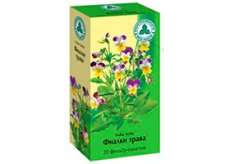Medical expert of the article
New publications
Preparations
Violet grass
Last reviewed: 04.07.2025

All iLive content is medically reviewed or fact checked to ensure as much factual accuracy as possible.
We have strict sourcing guidelines and only link to reputable media sites, academic research institutions and, whenever possible, medically peer reviewed studies. Note that the numbers in parentheses ([1], [2], etc.) are clickable links to these studies.
If you feel that any of our content is inaccurate, out-of-date, or otherwise questionable, please select it and press Ctrl + Enter.

Violet herb is an expectorant medicine. Its bioactive elements have anti-inflammatory, choleretic, bronchodilatory, disinfectant, antispasmodic and mild diuretic properties.
Decoctions and tinctures prepared from violet herbs enhance the excretory activity of the bronchial glands, soften plaque that occurs during inflammation, and also liquefy sputum, facilitating its discharge. At the same time, the medicine increases the motor ability of the ciliated epithelium located on the mucous membranes, accelerating the process of sputum secretion, which helps to relieve cough.
Indications Violet herbs
It is used during diseases affecting the upper respiratory tract, against the background of which a cough appears and sputum separation is difficult ( bronchitis in the active or chronic phase, whooping cough or bronchopneumonia) and inflammation in the bladder or kidneys, as well as urolithiasis (combined treatment).
Release form
The violet herb is released in packs of 50 or 60 g. It is also produced in filter bags of 1.5 g, 20 pieces each.
Pharmacodynamics
The anti-inflammatory activity of the substance is provided by the action of essential oils and mucus-like elements, which have a disinfecting effect on the gastrointestinal tract, potentiate the excretory capacity of the bronchial glands and facilitate the discharge of sputum.
Plant components increase the secretion of sweat with urine, improve metabolism in case of epidermal pathologies, have an antidiathetic effect and strengthen the strength of blood vessels. Violet roots have an emetic and laxative effect.
The action of violet saponins leads to the development of expectorant, diuretic and bronchodilatory activity.
The alkaloid violaemitin also has an expectorant effect.
Violaquercetin, which is a flavonoid glycoside, with local and resorptive action thickens the cell walls and inhibits the absorption of various elements through inflamed tissues.
After oral administration of violet products, some choleretic and antispasmodic effect develops.
Dosing and administration
To prepare the tincture, you need 1 tablespoon of the medicine and 0.2 liters of boiling water. The herb is poured with boiling water, then the container is covered with a lid and infused in a water bath (boiling) for 15 minutes. Then the decoction is cooled for 45 minutes, filtered and squeezed out. The resulting tincture is brought to a volume of 0.2 liters with boiled water.
The medicine should be taken warm, 3-4 times a day after meals.
- teenagers over 14 years of age and adults should use ⅓-½ cup;
- age category 12-14 years – ⅓ glass;
- children aged 7-12 years – 2 tablespoons;
- Children over 7 years old – 1 tablespoon.
The tincture must be shaken before use.
Take 2 filter bags and pour 0.2 l of boiling water over them, then close the container and leave to infuse for 15 minutes. The substance should be consumed warm, 3-4 times a day after meals.
- teenagers over 14 years old and adults – 0.5-1 glass;
- children aged 12-14 years – 0.5 glass;
- age category in the range of 7-12 years – ⅓ glass;
- children aged 3-7 years – 2 tablespoons of medicine.
The finished tincture can be stored at temperatures ranging from 8-15°C for a maximum of 2 days.
Use Violet herbs during pregnancy
The drug can be used during pregnancy only with the permission of a doctor and in cases where the benefit to the woman is more expected than the risks of consequences for the fetus.
Contraindications
Main contraindications:
- severe sensitivity associated with the bioactive components of the drug or salicylates;
- hepatitis;
- glomerulonephritis.
 [ 5 ]
[ 5 ]
Side effects Violet herbs
Severe sensitivity to drugs may cause signs of allergy (epidermal rash). In addition, vomiting, diarrhea or nausea may occur.
If side effects develop, stop using the medication and consult a doctor.
Overdose
In case of poisoning or prolonged use of violet herbs, vomiting, allergic rash, diarrhea and nausea may occur.
Storage conditions
Violets grass should be stored in a place closed to small children. Temperature values - maximum 30°C.
 [ 12 ]
[ 12 ]
Shelf life
Violet herb can be used within a 3-year period from the date of manufacture of the therapeutic substance.
Application for children
It is prohibited to prescribe to children under 3 years of age.
 [ 13 ]
[ 13 ]
Analogues
Analogues of the drug are Gederin and Bronchipret.
Attention!
To simplify the perception of information, this instruction for use of the drug "Violet grass" translated and presented in a special form on the basis of the official instructions for medical use of the drug. Before use read the annotation that came directly to medicines.
Description provided for informational purposes and is not a guide to self-healing. The need for this drug, the purpose of the treatment regimen, methods and dose of the drug is determined solely by the attending physician. Self-medication is dangerous for your health.

